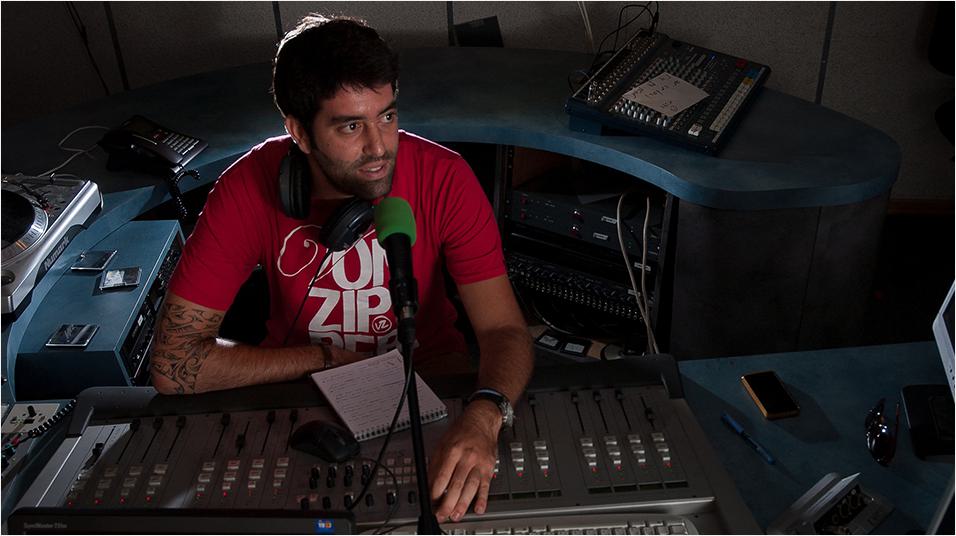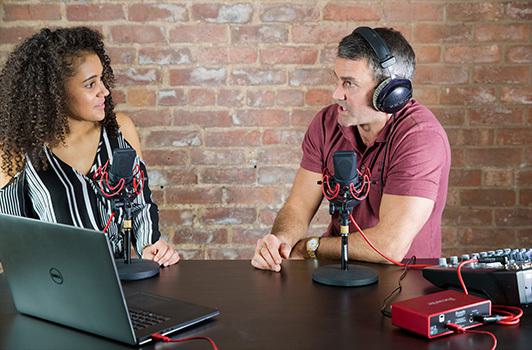Need advice? Let's talk.
Get straightforward guidance from your broadcasting partner. Schedule a call to chat with the team about your radio station.
Book DemoHow to Choose Talk Radio Topics for Your Shows
Supercharge your shows with compelling talk radio topics to attract listeners and create engaging content for your station.

Running your own radio station gives you the opportunity to create content that you want to make and broadcast without restriction. However, this freedom can be daunting. In this blog post, you'll discover how to choose talk radio topics for your shows and create engaging content for your station.
Themes, Goals, & Suitability
While many radio stations are flexible in terms of structure and the topics they cover, in general, most have predefined themes or goals so they always stay on point.
For example, you could run a breakfast talk show focusing on world news, which would appeal to a broad audience - Alternatively you could run a show on local news, which would be for a defined audience. Shows can be as broad or as specific as you want as long as there’s an overall theme or goal that’s consistently maintained.
Topics you choose to talk about could be anything from news and current events, educational topics like history or science, political commentary, sports, advice, music, satire and much more. Set targets to work with so your shows have purpose and direction.

Although the themes, goals, and topics that you choose could come from a wide array of subjects or interests, these should make sense in the context of your show or station. Having a discussion about the latest political news in between playing the latest chart hits may not provide the correct tone for your radio show. Make sure that the topics you choose relate to your other content and the overall tone of your station.
It’s all well and good building shows around topics, but you need to know your audience first before you can really get down to the hard work of actually writing your content.
Know Your Listeners?
We’ve all been there when someone starts talking about a topic we don’t really know or even care about. Immediately we disengage, that’s why before you do anything else it’s important to really understand your audience.
Knowing your listeners is the easiest way to guarantee that you pick topics that they can relate to, so how do you really get to know them?
The best place to start is research, so try:
- Analytics: Radio.co has built-in stats so you can find out the important things like listener locations, devices connected, and much more.
- Opinion Polls: Ask questions using tools like Google surveys and SurveyMonkey.
- Social Media: Use Facebook groups and Twitter lists to gather info about your audience and what they’re currently talking about. Both Facebook and Twitter have features for creating opinion polls, like Google, so your questions can reach as wide an audience as possible.
Knowing your listenership is vital in choosing topics for your radio shows. By understanding who listens to you and your show, you can carve a niche or market for your station. This, in turn, could result in expanding your audience, which you could learn about in our article about gaining more listeners.
Trending Topics
Often the best way to pick a subject is to look at current events by checking newspaper headlines or trending topics on the web.

You can easily track what’s going on around the world using Google news alerts or by following news agencies on Twitter, to name just a few.
Whatever trending topics you choose, be sure they’re relevant and on point with your station’s output - For example, if you’re a commercial chart station, talking about the latest pop hits might be the best fit. Talking about a Presidential election in between cheery pop hits may be out of character, compared to the latest celebrity news, for example.
The internet is a powerful tool for sourcing content, but it is important to filter out the irrelevant stuff that doesn’t add to your show or station’s output.
Hot Takes
With trending topics come trending views and opinions. Everyone has their own perspective, but people tend towards certain popular mindsets that they see reported through mainstream news. Sometimes, the best way to engage your audience is to provide the opposing view on a popular topic.
Presenting a unique perspective on a popular subject - whether negative or positive - can set you apart from the crowd and engage with people who may not even be aware of your station. This doesn’t have to be anything serious, it can be as simple as disliking a new song that everyone else seems to love, but it can draw a wide variety of people who agree and disagree with you, as well as inspire debate.
Once again, knowing your listeners is crucial here; trying to be too controversial with your opinions for the sake of it can appear like you’re just trying to be a contrarian to secure traffic, rather than share your honest views.
Feature Fun
Talk shows don’t always have to be serious discussions on lofty topics, sometimes you'll want to relax and do something a bit more informal. For example; featuring an ‘On This Day in History’ segment in your shows is an easy way of generating content.
A simple Google search can bring up plenty of topical historical events to talk about. Audiences love nostalgia and this will give them an opportunity to reminisce, as well as potentially provoke examination of the changing attitudes and cultures.
This doesn’t have to be the only informal content you feature on your show, look to the kinds of content BBC Radio 1 create and think about how you can have fun with your shows. Showing different dimensions to yourself and your guests can help listeners engage and relate with you.
Guests
Having a fresh perspective on things can really shake up your shows, that’s why guests are a good way of encouraging discussion and debate amongst your listeners. WHTZ-FM, KIIS-FM, and BBC Radio 1 always get new people on board to freshen up their shows.
Whether it is interviews with guests or phone-ins with listeners, other points of views provide interesting avenues of conversation which actually make it easier for you, as you only need to present a loose topic and then respond with follow up questions.
It’s also super simple to take live callers on air as you can use software like Skype or your phone to record audio, as shown below.
Guests, whether they’re celebrities or experts on the topic you’re talking about, can add real credibility and authority to your station. For example, no matter what genre your station is devoted to, interviewing well known or even local bands, artists, or experts will drive traffic to your station.
Celebrity star power or the addition of experts like this has such a big influence on listeners and opens up loads of talking points as they have a wealth of knowledge and experience to discuss.
Guest V. Guest
If the opportunity presents itself, featuring two guests with opposing views on topics can produce great content for your shows. The success of televised political debates demonstrates how audiences love to watch public figures battle it out in the public eye.
Hosting debates is great because you’ll effectively be doubling the reach of your station for that show by drawing in people who follow each guest. Chances are that the listeners will also get involved in the discussion if it’s something they’re passionate about!

Like normal interviews, acting as a mediator for debates can make your job easier, as you just guide guests through the topics and don’t have to add much input; they’ll be generating the content for you. This format can fit for any genre, as any subject has people with differing views, whether it be arguing historical events, politics, film and literature and much more, there’s always something to dive into.
Whatever topics you decide on, keep your audience in mind. Hopefully, this has given you some food for thought and good starting points on the road to creating some awesome radio shows!
What to Do With All These Topics & Content
Once you have assembled all your topics for your radio show, it’s a great idea to plan them out.
One of the most tried and tested ways to do this is to create a show clock. It’s essentially a pie chart with all the elements of your show mapped out hour by hour. You can break down the chart to have news at the top of the hour; songs throughout and what features you want to broadcast at specific times.
By organising your topics and content with a show clock, you can give your show a rigid structure that helps you sound more professional. Styles of radio differ greatly: some people like to prepare and some like to improvise. However, a show clock is a great way to discipline your output and make your content more engaging for your listener.
Here’s an example of a basic show clock:
Your Turn: Choose Talk Radio Topics
If you have any other great ways to find content and choose topics for your station, be sure to leave a comment below or get in touch with us.
If you’re not already running your own shows and thinking about getting started then now is a perfect time! Join the Radio.co family by starting your 7-day free trial to get up and broadcasting today. Alternatively, if you’d like to talk to a radio expert about your station’s content, you can book a demo here.



